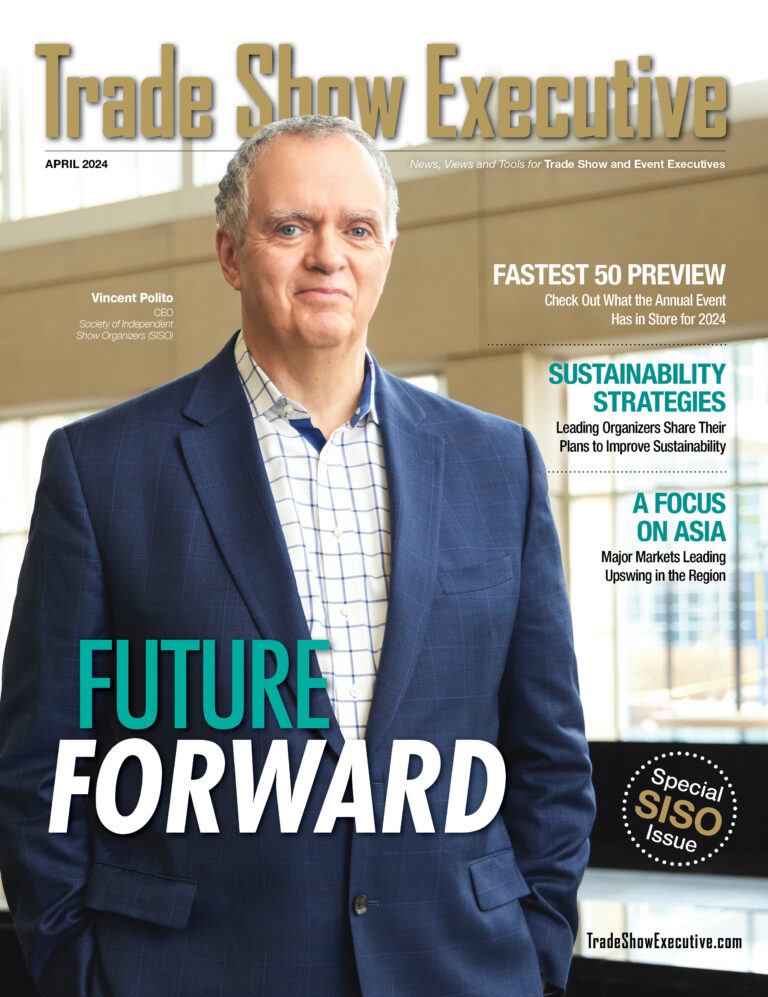 PARIS — With 700 participants from 51 countries and regions and 16 hours of live sessions broadcast from Hong Kong, Dubai, London, and Bogotá, the 87th UFI Global Congress was the organization’s most ambitious event to date. The tone in many sessions was upbeat, acknowledging the crushing losses faced by the industry but hopeful, with two highly effective vaccines fresh in the news.
PARIS — With 700 participants from 51 countries and regions and 16 hours of live sessions broadcast from Hong Kong, Dubai, London, and Bogotá, the 87th UFI Global Congress was the organization’s most ambitious event to date. The tone in many sessions was upbeat, acknowledging the crushing losses faced by the industry but hopeful, with two highly effective vaccines fresh in the news.
Engagement was high, with many attendees booking appointments on the Congress platform and participating in the various chats and networking sessions. Attendees were pleased with the format, which allowed people to attend sessions and networking with their specific business hours in mind, and included repeats of some sessions on Day Three.
“We completely rebuilt the way we deliver the program — from all over the world, having all regions and time zones in mind,” said Kai Hattendorf, UFI Managing Director and CEO. “And we had to create some experiences for everyone, despite being limited to screens. For me, what I will remember years from now is the small concert we staged in the empty exhibition hall at ExCeL London — and the sound of the ancient Stradivari in that vast space.”
Travel Is the Key to Recovery
The November 17 Keynoter Gloria Guevara Manzo, President & CEO, World Travel & Tourism Council (WTTC), laid out the case for travel being at the heart of our recovery from this pandemic. With 142 million jobs impacted already, we will likely reach 174 million jobs that will be lost globally by the end of the year, according to the WTTC.
“When we have international coordination to resume travel, and when governments work together, we will recover more quickly,” said Guevara.
She outlined the four steps we must take toward recovery:
- Developing a coordinated approach to opening travel between countries, with international testing protocols replacing quarantines, and limiting quarantines only to those who test positive.
- Creating a seamless travel experience, using a universally accepted health certificate, once the vaccine starts being distributed, to clear people to travel.
- Ensuring that protocols are global and consistent, not country by country.
- Continuing government support for this industry: fiscal, liquidity, and assistance for workers.
Guevara spoke of the WTTC’s Safe Travels stamp, which is being used by tourism entities from hotels to convention centers to attractions in 190 countries and destinations. Another milestone was this October’s G20 Riyadh Summit, where the ministers of tourism of participating countries invited CEOs from the travel sector to develop a plan to bring back 100 million jobs.
“Once the vaccine is widespread, we will have growth,” she said. “We have had growth after every global crisis, from 9/11 to the financial crisis. The proof that this will happen again is that live meetings have already almost completely recovered in China. Business travel will include more of a digital agenda, but we will continue to have a strong business travel segment.”
Effective Government Responses to COVID-19
In the midst of a global pandemic that continues to devastate the events industry, government support has never been more essential. Panelists representing government bodies in Hong Kong, Singapore, and Thailand discussed what can be done to protect the future of the exhibitions industry in Asia.
The big news discussed during the session is the Regional Comprehensive Economic Partnership (RCEP). It includes members of the Association of Southeast Asian Nations (ASEAN) and five regional partners and is being touted as the largest free trade agreement in history. For the first time, RCEP unites China, Japan, and South Korea in a trade agreement that includes 10 Southeast Asian countries in addition to Australia and New Zealand.
Kenneth Wong, General Manager, MICE & Cruise at the Hong Kong Tourism Board, said during the session that this arrangement has created the largest trading block in the world and offers a real opportunity for conventions and exhibitions.
Reliable antigen COVID tests are seen as the key to reopening events, and in this respect, Singapore is leading the way. Andrew Phua, Executive Director, Singapore Tourism Board, discussed TravelRevive, the city-state’s first trade show to pilot the newly developed prototype for safe business events, safe itineraries, and digital enablers in Singapore. These pilot programs underscore Singapore’s commitment to restarting business events such that they are safe, trusted, and innovative.
Related. New Rapid Self-Administered COVID-19 “Home” Test Will Help Shows Get Back on the Road
He also referenced what he says can be a real game-changer – a COVID-19 breathalyzer test currently under development and expected for release in the first quarter of 2021.
“It’s about getting people confident to attend trade shows once again,” said Stuart Bailey, Chairman of Hong Kong Exhibition & Convention Industry Association (HKECIA).
The travel industry is watching closely to see if the quarantine-free Singapore-Hong Kong travel bubble will succeed and if so, which other countries will create bubbles in the region. According to Nichapa Yoswee, Senior VP-Business, Thailand Convention and Exhibition Bureau (TCEB), Thailand is working on possible bubbles with China, Singapore, Malaysia, Hong Kong, New Zealand, and South Korea.
Related. “Air Bubble” to Open Travel Between Hong Kong and Singapore
Power of the People
In another session, panelists including Sonia Thomas, UFI, Director of Operations/COO; Mary Larkin, President, Diversified Communications USA and UFI President; Jose Navarro Meneses, Director General, Tarsus Mexico; and Ashanti Bentil-Dhue, Co-Founder Diversity Ally, Speaker and Diversity Expert agreed that we need to embrace technology.
“It is important for us all to raise the digital literacy level,” Bentil-Dhue said. “Hybrid will be in our trade shows, as well as in the teams we run.”
Larkin agreed that digitalization is now more important than ever.
“Raising digital literacy and managing toward deliverables is important. We are going to have to adapt as we go along, but human nature does adapt. We haven’t really studied how much we have changed as organizations and as a work force in the last eight months,” Larkin admitted.
Meneses said trade shows are going to be different and that there is no going back to normal anymore as a new normal will definitely be created.
“The exhibition industry is all about people and it is people who will ensure our future success,” Thomas said.
With more people now working from home than ever before, a great deal of adaptability has already taken place. “The line between work and personal life has become very blurred over the last few months,” Thomas added.
As a result, flexibility, transparency, and communication has become more important. “There is true fear and so much uncertainty in every part of our lives. Our work lives have changed; our personal lives have changed,” Larkin said.
Bentil-Dhue added, “We have to be willing to be vulnerable and honest about what is happening and always provide clear pathways.”
Industry Heavy Hitters Share Hits and Misses
The final day of the Congress featured a panel of four top industry leaders — Carina Bauer, CEO, IMEX Group; Hugh Jones, CEO, Reed Exhibitions; Simon Kimble, Chairman, Clarion Events; and Charlie McCurdy, President & CEO, Informa Markets, who shared some of their winning — and losing — strategies from going digital.
Bauer called the virtual version of IMEX Americas, known as PlanetIMEX, a “great experiment,” but admitted they learned from the attempt that it’s key to “distill down the key purpose and strategy of the event and what you want to deliver online, rather than do a cookie cutter version of your show online and expect it to work.”
“You don’t take the binder of the successful 2018 show and think it’s going to be a success digitally,” said Jones. “When you start going hybrid, you are competing against the entire Internet, not just another show, and that funnel is much larger.” B-to-C events, he said, such as those in the gaming industry, can serve as a model.
One of the biggest lessons Jones has learned in the past year is, “in a time of crisis, your exhibitors and visitors will allow you to fail,” he said. “Your webinar might go flat, but there’s a sense of gratefulness that you tried. At least you did something. At Reed, we test, we learn, we test again, and over time our hybrid solutions become better and better.”
Kimble spoke of Clarion’s recent acquisition of Quartz Events as a huge plus. “It enables us to move to non-live events. We need to be able to run a business when events are not happening.” His current focus is adding talent from outside the industry. “We can learn from their different experiences. This is a perfect time to try different things.”
McCurdy, whose company just held four back-to-back live shows, is excited about the technologies of the future and how they will impact shows. “We still have a long way to go on things like smart connectivity and gaining insights on the needs of our constituents.” But in the end, he said, “We see ourselves as market makers who enable commercial activity in these markets that rely on us so heavily. It’s just that the way we do that has changed.”
Reach Kai Hattendorf at (33) 1 46 39 75 00 or kai@ufi.org.











